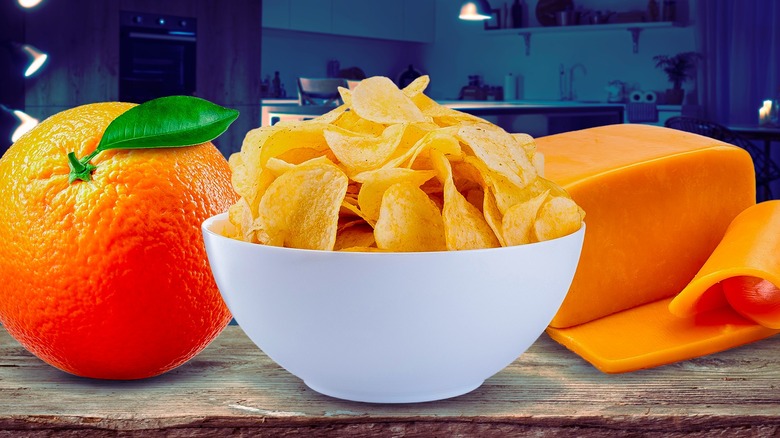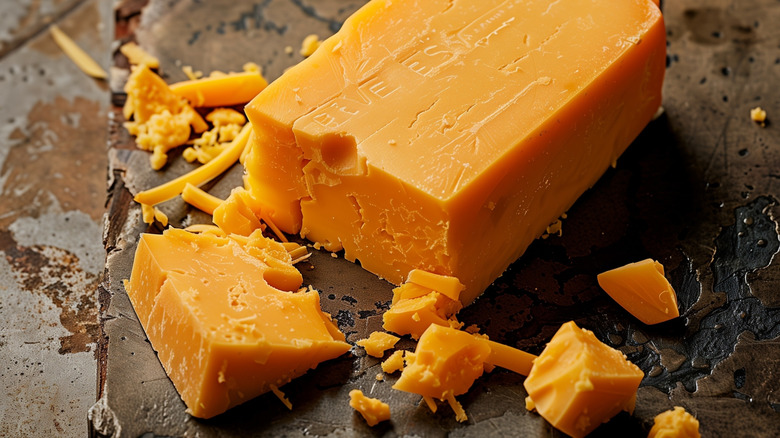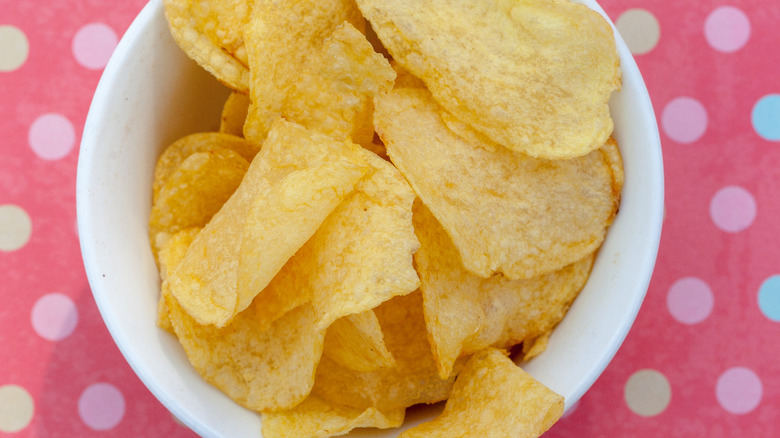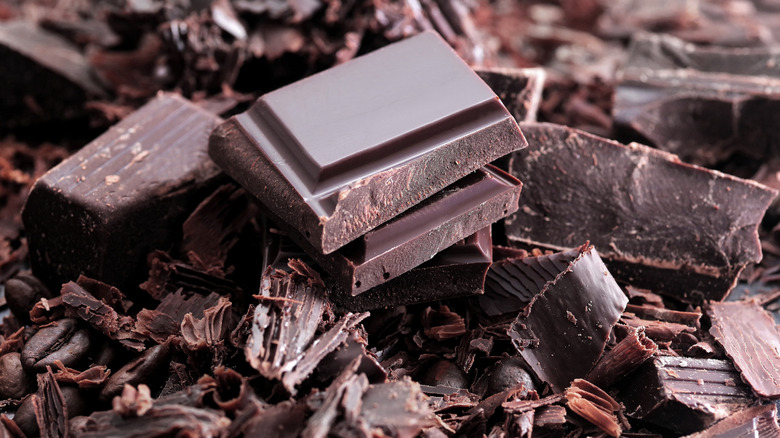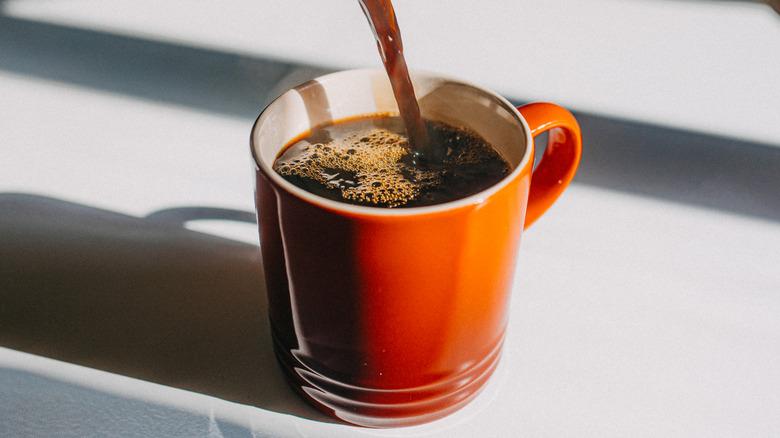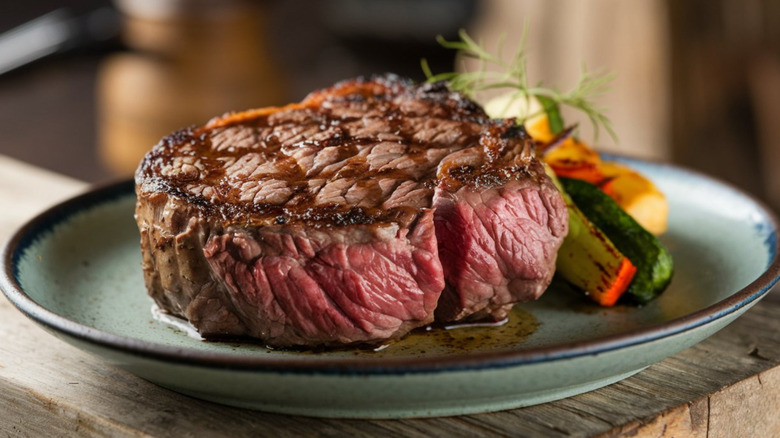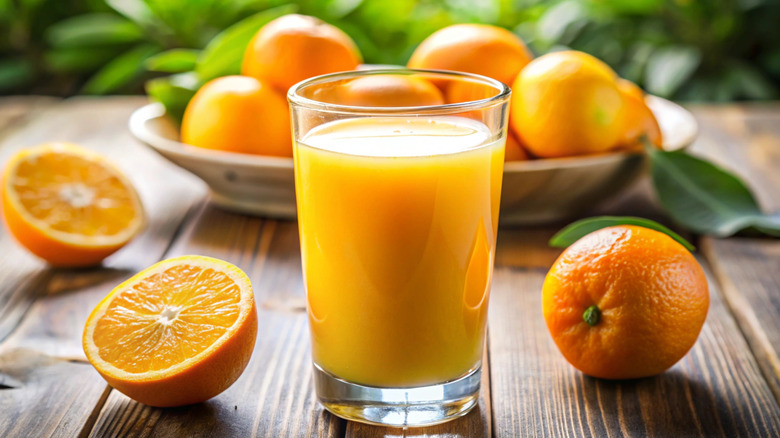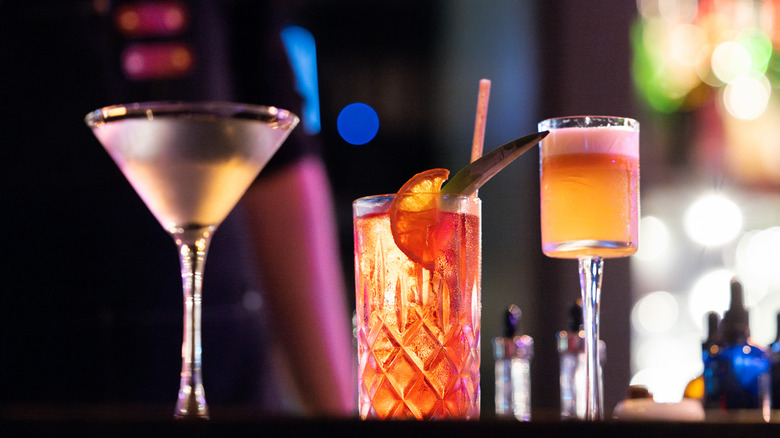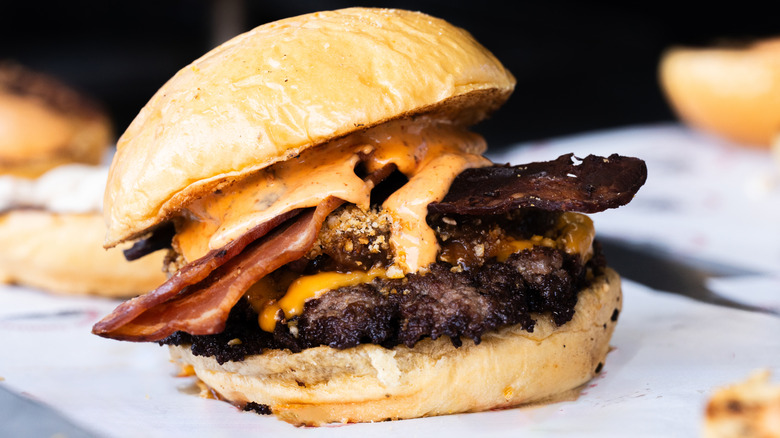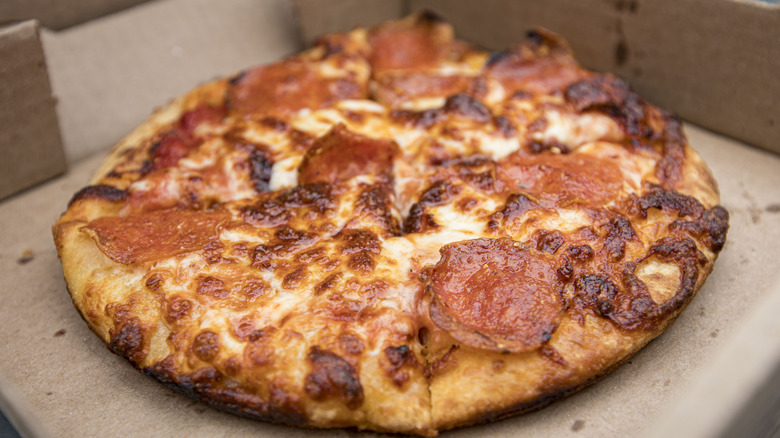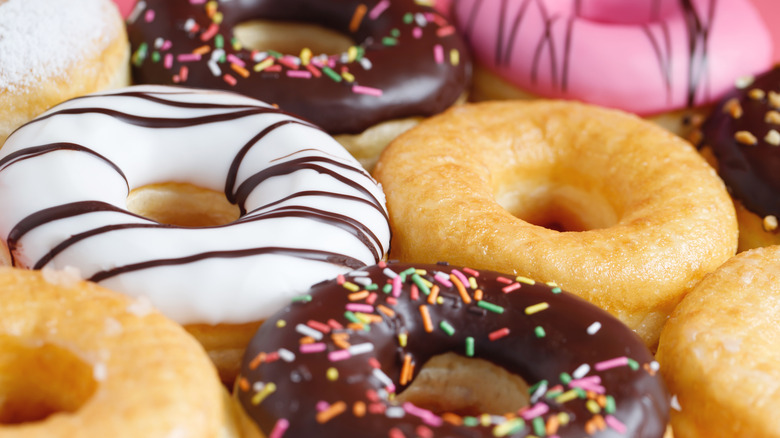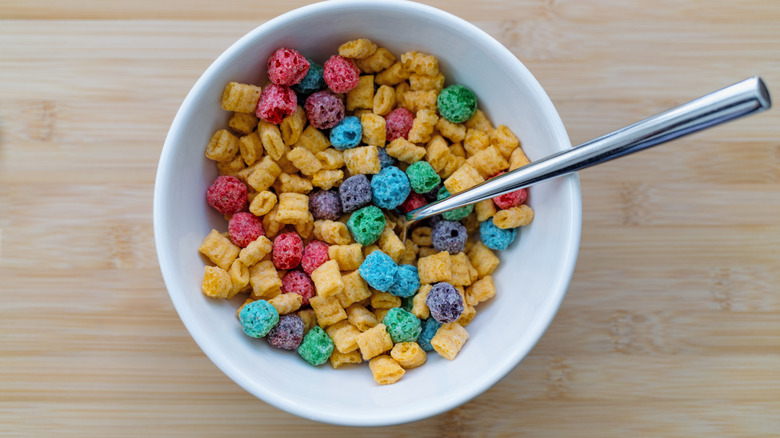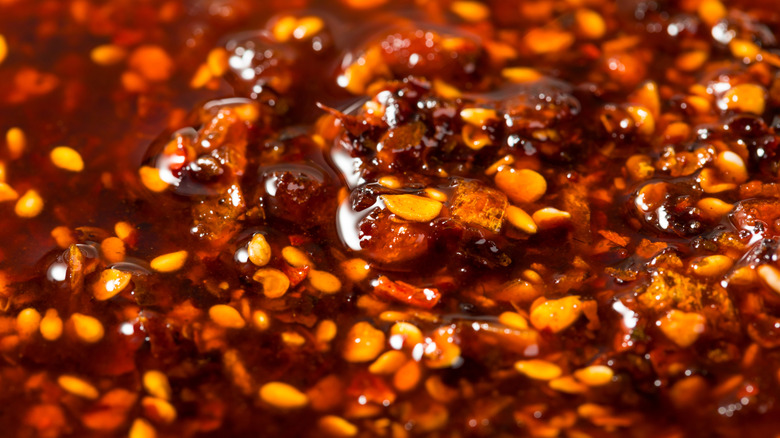People Who Eat These 12 Foods Late At Night Are Putting Themselves At Risk
Our whole lives, most of us have been told that food is to be eaten on a certain schedule: breakfast in the morning, lunch in the early afternoon, and dinner around nightfall. But not everybody's body follows such a strict nutritional intake pattern, and that's why snacking was invented. If dinner is eaten around the early evening, and one stays up until late into the night, that's quite a few hours that have passed to allow the stomach to empty. That, or thirst kicks in, or the desire to consume a little something to settle the stomach or invite sleep. It's a common occurrence, and that's where mistakes can happen.
Different foods trigger all sorts of processes in the body, or they stimulate the production of various chemicals, acids, and hormones. Many of those things upset or agitate the brain or body when they're supposed to be processing or resting. Therefore, there are some foods that are best to avoid in the post-dinner, pre-bedtime hours, even if they are ostensibly healthy. If you want to get a good night's sleep or not send your body through a bunch of internal labor, don't eat or drink the following things.
Aged cheeses
Some cheeses are actually very healthy to consume in the final waking hours of the day. Cottage cheese, for example, can lead to a production boost of the feel-good hormone serotonin, and it also packs a lot of casein. That protein is slowly digested, and it stops the body from breaking down muscle mass during sleep. However, the many proteins and compounds present in cheese can trigger a lot of other processes while the body rests. The old supposition that eating too much dairy before bed can cause nightmares is partly true — studies show that the dreams get weirder and darker the higher the individual's level of lactose intolerance.
But those more flavorful, interesting, and longer-aged cheeses can do the most damage while you're out. Popular varieties hard and soft, such as cheddar (and the misleading white cheddar), blue cheese, and feta contain tyramine. That amino acid makes the body release stress hormones, provoking the fight-or-flight response. That doesn't lead to very restful sleep. The effects are even more pronounced for people who take MAOI inhibitor medications to treat depression. In that case, tyramine can trigger migraines and dangerous spikes in blood pressure.
Potato chips
Potato chips are one of life's simple pleasures, made from thinly sliced pieces of real potato that have been fried in vegetable oil, sprinkled with salt, and perhaps that's it. But the very thing that makes potato chips so satisfying on a base level are the same reasons why they're not the most healthy snack to indulge in just before bed.
While the human body needs salt to live and to stay hydrated, too much of it can lead to dehydration and a subsequently sickened stomach. Potato chips are so satisfyingly salty, with as much as 10% of a serving composed of sodium, that they can easily lead to dehydration and its unpleasant side effects, including insomnia and poor sleep.
Medical studies indicate that the excessive salt found in chips makes the body keep itself awake for an additional couple of hours. Then, after sleep comes, the body may awaken multiple times throughout the night, if only for the pressing need to drink water. That decreases the chance and volume of deep sleep while also potentially triggering more and darker, frightening dreams. Salty chip eaters reported waking up for good the next day earlier than they would've liked, followed by grogginess.
Chocolate
When it's consumed in most any other part of the day, chocolate may offer many nutritional benefits. When the deleterious effects of the sugar and fat used to make raw, bitter cacao into sweet and creamy confections come into consideration, dark chocolate is actually healthier than milk chocolate, and the treat is loaded with antioxidants, including theobromine, a chemical that can help offset the development of type II diabetes and heart disease. Chocolate is derived from cacao, a certified superfood rich in magnesium, calcium, and zinc.
If one is going to eat dark chocolate, however, it's advisable to do so as anything but a midnight snack. Theobromine, for all its glories, can also act as a natural stimulant, charging up the body when it's supposed to be sleeping. The body reacts to that antioxidant as if it were caffeine, which is also found in significant numbers in chocolate of all varieties. That means just a little bit of even the worst-tasting dark chocolate has two kinds of wake-up chemicals in it, which might delay sleep for hours.
Coffee
While coffee has powers we're only beginning to understand, it's not exactly a secret that coffee isn't the best thing to drink late in the day if one wants to get a good night's sleep. Coffee is famously the pre-eminent breakfast or first thing in the morning drink, or all through the day if the need is there, because it provides such a quick and reliable jolt that almost instantly provides wakefulness and high performance. The active and physically addictive ingredient in coffee is caffeine, which in moderate to high amounts, wards off the body's natural inclination to sleep.
The gastrointestinal tract absorbs the caffeine from the coffee (or black tea, green tea, or soda) deposited in the stomach, and sends it throughout the circulatory system to the brain. That's where it prevents certain receptors from firing, such as the ones that regulate sleep. Caffeine literally prevents the brain from sending out signals to tell the rest of the body that it's tired and needs to rest. The central nervous system responds to the caffeine, too, causing things like alertness and the jitters.
All that's bad for sleeping, but highly caffeinated beverages like coffee and some teas are especially problematic late in the day. They upset circadian rhythms, or the body's natural, 24-hour clock. It messes up neuro-chemical procedures and confuses the body about what time it is, affecting sleep patterns for more than just the day on which the coffee was consumed.
Steak
No matter the specific cut, a steak is one of the most bountiful sources of protein in all of food. A 10-ounce sirloin contains 50 grams, and a filet mignon of the same size has 48 grams. Proteins are a complex molecule and it takes the body a long time to digest and break them down into usable materials, much longer than it does to process carbohydrates. That results in a prolonged feeling of fullness, which isn't such a great feeling if that gigantic steak eaten a few hours previously is still sitting in the stomach or making its way through the digestive system.
Sleep is when the body eases up on many of its functions, including the digestive system. It's normally working at about 50% capacity during sleep. Presenting the resting digestive system with the substantial challenge of a dinnertime or late-night protein bomb is more than it can handle, and the overall discomfort may contribute to sleep interruptions.
Anything citrus
What unites citrus fruits, including oranges, lemons, limes, and grapefruits, besides botanical similarities, taste, nutritional profile, geographical background, and bearing bright colors: They're all very acidic. Specifically, citrus fruits are chock full of citric acid, which, when consumed, leads to the production of more stomach acid to aid in the digestion of the somewhat caustic fruit and certainly its juices.
An overabundance of stomach acid isn't great for the body, particularly a sleeping body. If that acid moves up into the esophagus, that bothers the esophageal lining, or a telltale sign of gastroesophageal reflux disease, or GERD. Symptoms of GERD include a burning feeling in the chest, otherwise known as heartburn, as well as pain in chest, stomach, and a lump in the throat. At night, GERD can lead to such sleep-interrupting things like trouble breathing, vocal cord inflammation, and a persistent cough.
Drinking raw orange juice can be dangerous, but so can the store-bought and pasteurized stuff. The more sugary forms of citrus fruit, namely orange juice, can also cause blood sugar spikes, which forces the body to go into insulin-release mode to counteract all that quickly-absorbed fructose.
Alcohol
A bottle of beer, a glass of wine, or whiskey served neat are all strongly associated with the end of the day, whether it's a tipple enjoyed after a shift of work or just before bed. There's a perception that, because of its ability to change moods or the state of consciousness, alcohol helps human beings relax. At least one study has found that around 10% of adults drink alcoholic beverages specifically and explicitly to help themselves calm down at the end of the night and assist in lulling them to sleep. And on a scientific level, it totally works: Alcohol is indeed a sedative, but it can also simultaneously stimulate many of the body's systems.
After that alcohol has helped a person fall asleep, it starts to work its mischief, interrupting and then preventing deep-sleep cycles, or rapid-eye movement, from taking place. That's the part of the night when the brain goes to work, processing thoughts, memories, and actions and allowing the body to rest, heal, and be restored. If alcohol doesn't let that happen, then the sleep isn't as restorative as it could be. In habitual drinkers, a chronic lack of REM sleep can lead to mental health issues, such as anxiety, depression, poor emotional regulation, and memory loss.
And while it's somewhat counterintuitive, drinking may be linked to insomnia. Nearly three-quarters of people with a drinking problem also suffer from an inability to sleep properly.
Hamburgers
If dinner is five or six hours in the past, and one's stomach is rumbling, and all the major fast food chains stay open until midnight or after these days, it can be very tempting to grab a second, mini dinner in the form of a big juicy cheeseburger. But unless you plan on staying up for a few more hours to let your body deal with all that food you've just plopped into the stomach, it's probably going to invite a lot of problems when you decide to give going to sleep a try. Dealing with a meal's worth of calories when the body isn't really used to it can cause higher rates of blood pressure and pulse, not to mention heartburn and indigestion.
A cheeseburger on a bun contains very little fiber, a fair amount of hidden sugar, and a wallop of saturated fat. There's a scientific connection between eating low-fiber, high-sugar, and high-fat meals with sleep problems. Those substances interrupt sleep and make it less restful. There's also evidence that suggests eating foods like cheeseburgers regularly, no matter the time of day they're eaten, with bad sleep correlating to a diet rich in sodium and saturated fat.
Pizza
Pizza is one of the most universally agreed upon dishes, but the unique combination of ingredients required to make it also conjures a perfect storm of sleep thievery. Pizza is necessarily covered in cheese, which naturally leads to the creation of the compound tyrosine. Inside the body, it causes a rise in cortisol and adrenaline, stress hormones that get the heart beating, the blood plumping, and the senses on high alert — the opposite of resting and relaxing.
All that cheese contributes to pizza's large volumes of calories and saturated fat. It takes a while for the stomach to process all that food, while the acidity of the tomato-based pizza sauce is a common trigger for acid reflux, which is exacerbated by and feels all the more painful in a horizontal position. The sodium and spiciness in any pepperoni or sausage on that pizza are just one more source of gas, diarrhea, bloating, and overall gastrointestinal discomfort when you're laying there awake. This is to say nothing of the pizza's crust, made from refined carbohydrates that can lead to a blood sugar spike, or how late-night dairy consumption has been proven to inspire dark dreams.
But such troubled sleep may be delayed anyway. Tyramine can be found in both aged and heavily processed cheeses as well as in popular pizza toppings like pepperoni and salami. Once that chemical hits the blood, it leads to the production of the hormone norepinephrine, which stimulates the heart as well as the brain.
Doughnuts
Scientists who deal with food classify carbohydrate-rich foods by their glycemic index. The higher a food's G.I., the more profoundly and immediately it causes a rise in blood glucose level, forcing the production and distribution of insulin, adrenaline, and cortisol to keep things regulated. It's so much so fast that a person may experience agitation, anxiety, blood glucose dips, and even hunger, because high G.I. foods generally don't offer much in the way of satiating fiber or overall nutrition. For example, berries have a low G.I., while refined carbohydrates like white flour and refined sugar are among the foods with the highest G.I.
A doughnut provides a double dose of high G.I. materials in that the pastry itself is made from nutritionally vacant and heavily processed white flour, and any frosting or glaze added is created with lots of sugar. There's a clinical link between both refined carbs and sugar and sleep problems. While a big hit of carbohydrates can actually make a person nod off, the sleep that follows generally isn't great. Studies show that insomnia can and often does result after eating doughnut components like white flour and refined sugar, studies show, while others connect a diet that includes regular consumption of things like doughnuts with lackluster sleep.
Sugary cereal
Cereal, even the varieties made with the most sugar or sugar-like sweeteners, may seem like a healthier, less caloric, and relatively fat-free alternative to more traditional nighttime desserts like ice cream, cake, or cookies. In recent years, cereal manufacturers have even marketed their wares for its snacking potential or as an inexpensive meal replacement. And while it's accurate that even heavily sweetened cereals aren't as sugar-packed as those other treats, it can still lead to some unattractive effects come bedtime.
The majority of cereals have a high glycemic index, particularly sugary cereals, which means the body goes to work to unleash all kinds of hormones to cope with and process that sudden, unexpected load of carbohydrates. The processed grains and refined sugar that make up those cereals lead to a quick and significant rise in blood sugar, and then a rapid drop called hypoglycemia. That could be so serious that it makes a person wake up in the middle of the night, seeking another quick hit of something sugary.
Spicy stuff
It's something of a myth that eating a lot of spicy food before bed can lead to nightmares, but that doesn't mean a plate of hot wings or a big bowl of curry are necessarily going to lead to a pleasant and easy overnight. Spicy, fiery-hot food can be rough on the body, and it can lead to feelings of indigestion and serve as a trigger for acid reflux and heartburn. As one tries to sleep in a horizontal position, that back flow of acid generated can head up to the esophagus and cause painful, sleep-interrupting agitation.
Water doesn't help with spicy food, and it takes time for it to work its way through the body, too. Generally, the heat in spicy food comes from peppers, and the chemical responsible for that sensation is capsaicin. There's scientific evidence that the substance leads to a rise in body temperature due to the process of thermogenesis, in which cells turn food energy into literal heat. It's hard to sleep when you're uncomfortably warm.
